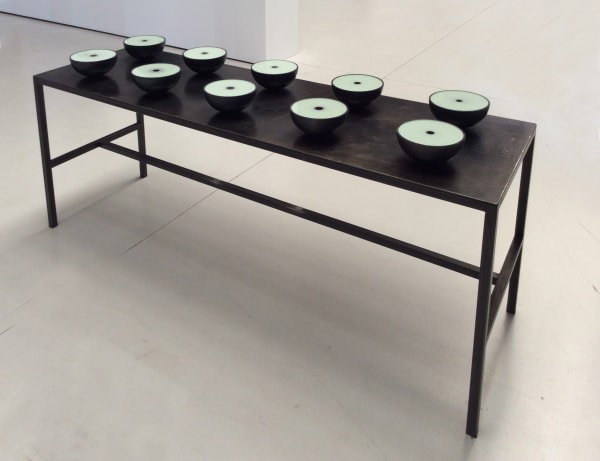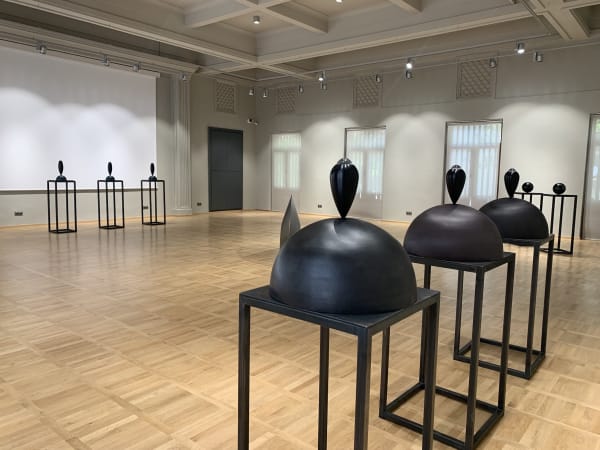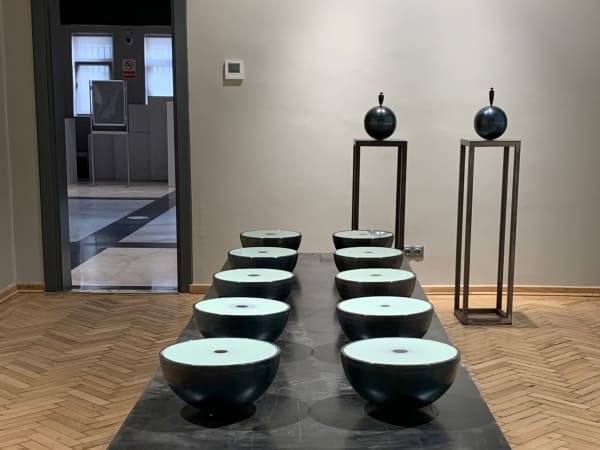Osman Dinç: Theorem 2
Osman Dinc's latest exhibition Theorem II which will take place at Tarık Zafer Tunaya Cultural Center between 3 - 30 September 2021 is a sequal of the Theorem exhibition held in Istanbul in 2014.
Seen by many in the art world as being somewhere at the crossroads of Arte Povera and Miminalism, Dinc describes his general approach to his artistic practice and creative process as: "Sculpture is a three-dimensional examination of real space. This is why it brings with it so many figural issues to the fore - gravity, balance, suitability and durability of material are all brought together through the medium of sculpture."
For Dinc, iron has long been one of his key media when it comes to sculpture. He explains: "When I wanted to improve my knowledge of iron, which I have been using quite often over the last few years, I learnt many things (apart from the iron oxide we carry in our red blood cells). I examined the Iron Age, taking me back some four, five thousand years. Now I also know that we live in a celestial body which stores 40 percent of the world's iron and nickel in its core. Moreoever, I learnt that there is iron in the bodies of ancient, collapsed stars - iron is durable; iron atoms are the longest-lasting atoms in the entire universe.
"For me, it is the idea of construction and deconstruction that embodies humanity - from the Iron Age to the modern era we live in. Every material I use has its own history, and leaves a trace within our collective memory. As an artist, I need to progress alongside the history of a material, and in using something like iron, there is an act of archaelology - an act of preserving forgotten collective memories. The characteristics and age of the iron - as well as the other materials I use - are important. Whether working on a sculpture on my own, or overseeing their production on machines, depending on their size, I reflect on the experiences of the great masters who have gone before, as well as seeking to look ahead to the next generation. As Oscar Wilde once so eloquently said, "The true mystery of the world is the visible, not the invisible."
-

Osman Dinç
Rainbow
2013
Steel
92 x 100 x 30 cm
-

Osman Dinç
Overhead Black Hole
2012
Steel and glass
140 x 50 x 50 cm / each
-

Osman Dinç
Overhead Cataract
2012
Steel and glass
140 x 50 x 50 cm / each
-

Osman Dinç
Feast
2013
Steel and glass
200 x 60 x 80 cm
-

Osman Dinç
Billions of Atoms
2011
Steel
40 x 40 x 90 cm (9 pieces)
-

Osman Dinç
Kara Bilecen
2012
Steel
130 x 30 x 30 cm / each
Osman Dinc's latest exhibition Theorem II which will take place at Tarık Zafer Tunaya Cultural Center between 3 – 30 September 2021 is a sequal of the Theorem exhibition held in Istanbul in 2014.
Seen by many in the art world as being somewhere at the crossroads of Arte Povera and Miminalism, Dinç describes his general approach to his artistic practice and creative process as: “Sculpture is a three-dimensional examination of real space. This is why it brings with it so many figural issues to the fore – gravity, balance, suitability and durability of material are all brought together through the medium of sculpture.”
For Dinc, iron has long been one of his key media when it comes to sculpture. He explains: “When I wanted to improve my knowledge of iron, which I have been using quite often over the last few years, I learnt many things (apart from the iron oxide we carry in our red blood cells). I examined the Iron Age, taking me back some four, five thousand years. Now I also know that we live in a celestial body which stores 40 percent of the world’s iron and nickel in its core. Moreoever, I learnt that there is iron in the bodies of ancient, collapsed stars – iron is durable; iron atoms are the longest-lasting atoms in the entire universe.
“For me, it is the idea of construction and deconstruction that embodies humanity – from the Iron Age to the modern era we live in. Every material I use has its own history, and leaves a trace within our collective memory. As an artist, I need to progress alongside the history of a material, and in using something like iron, there is an act of archaelology – an act of preserving forgotten collective memories. The characteristics and age of the iron – as well as the other materials I use – are important. Whether working on a sculpture on my own, or overseeing their production on machines, depending on their size, I reflect on the experiences of the great masters who have gone before, as well as seeking to look ahead to the next generation. As Oscar Wilde once so eloquently said, “The true mystery of the world is the visible, not the invisible.”
Osman Dinç. Born in 1948, Bozkurt, Denizli Turkey. Living and working in Paris since 1977, he has been a lecturer at L’Ecole Nationale Superieure D’Art De Bourges’da between 1990- 2011. Dinç still continues working on his art in Paris, Ankara and Chatauneuf-Sur-Loire.
Major exhibitions include; Theorem II (solo), Tarık Zafer Tunaya Cultural Centre, Istanbul,Turkey (2021); At The End Of The Day, OMM Museum, Eskisehir, Turkey (2020); Les objets encombrants pour le voyage (solo), Tauves, France (2020);Ankara-Istanbul (solo) Tophane-i Amire, İstanbul, Turkey (2019); Dessiner l'horizon (solo), Galerie Municipale Julio Gonzalez, Arcueil, France (2018); Beewax is the Elbow Grease of Bees(solo), Pi Artworks Istanbul, Turkey (2018); What's The Riddle,Pi Artworks London, UK (2016); A Story of the World(solo), CerModern, Ankara, Turkey (2014); Les Jeux De l'Eau Et du Miel,L'Agart, Amilly, France (2014); Theorem(solo), Pi Artworks Istanbul, Turkey (2014); Cosmic Touch, Espace Art Roch, Paris, France (2013); Logique de la mappemonde, l'École nationale supérieure d'art de Bourges, France (2013); and out of Istanbul, Slought Foundation, Philadelphia, ABD (2008). Dinç has been the recipient of numerous awards, including the Ankara Art Foundation's 2002 Sculptor of the Year, the 1993 UNESCO Sculptor of the Year, and has been thrice awarded the State Museum of Turkey's Sculpture and Painting Award. Major collections include; ARTER, Istanbul, Turkey. Circa Marseille, Marseille, France; The Art Collection of the Municipality of Paris, France; Istanbul Modern Museum, Turkey; Merkez Bank Collection, Turkey; The Musée de Annecy Collection, France; and the State Museum of Sculpture and Painting, Ankara, Turkey.
For information, images and sales:
Pi Artworks Istanbul & London
info@piartworks.com
ed@piartworks.com
Tel: 0212 245 13 23
Address: Mumhane Cad. No: 50/3. 34425, Karaköy, Beyoğlu, Istanbul
















